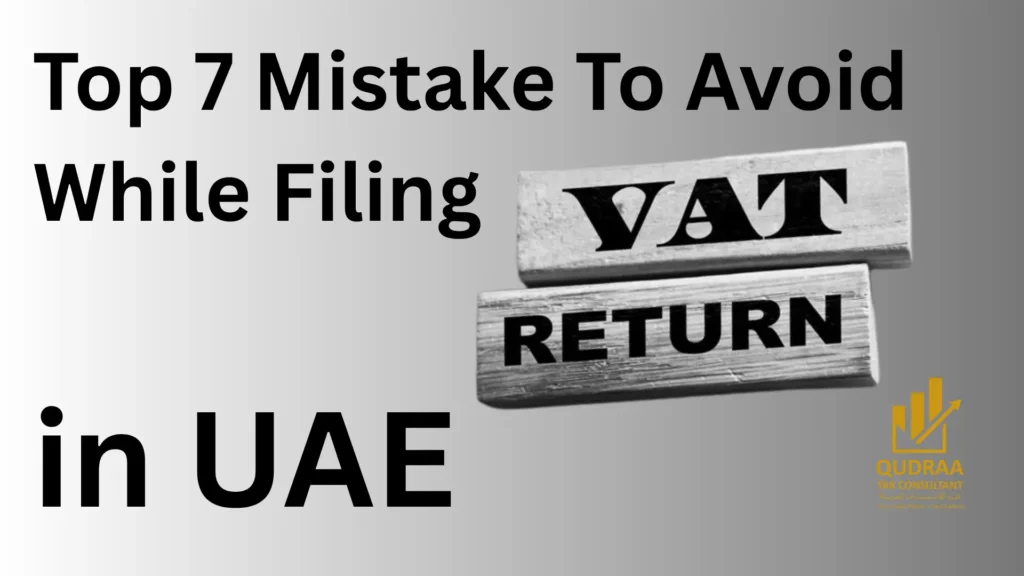
Value Added Tax (VAT) compliance is a critical responsibility for businesses operating in the UAE. The Federal Tax Authority (FTA) requires accurate and timely VAT returns, and even small mistakes can lead to hefty penalties, audits, or reputational risks.
At Qudraa Tax Consultant, we regularly assist UAE businesses in identifying and correcting VAT-related errors. From VAT registration to return filing and audits, our team ensures that companies remain compliant and penalty-free.
1. Incorrect VAT Registration Details
Why Accurate Information Matters
Many businesses rush through the VAT registration process and provide incomplete or incorrect details. Errors in the Tax Registration Number (TRN), business address, or trade license details can cause compliance issues later.
How to Correct VAT Registration Errors
Always verify your details on the FTA portal before submitting. If errors occur, file an amendment immediately to avoid fines or blocked submissions.
2. Misreporting Sales and Purchases
Underreporting or Overreporting Sales
Incorrectly reporting taxable sales is one of the most common VAT filing errors. This often happens when businesses fail to separate standard-rated, zero-rated, and exempt transactions.
Common Input VAT Claim Errors
Businesses sometimes claim input VAT on ineligible expenses (e.g., entertainment or employee benefits). This can lead to penalties or rejected claims.
Tip: Use accounting software to classify sales and expenses properly.
3. Missing or Incomplete Documentation
Importance of Tax Invoices and Supporting Records
The FTA requires businesses to maintain tax invoices, credit notes, and supporting documents for at least 5 years. Missing or incomplete records raise red flags during audits.
FTA Audit Risks Due to Poor Documentation
Without proper documentation, your VAT return may be considered inaccurate—even if errors were unintentional.
Solution: Keep digital and physical copies of all VAT-related records for easy reference.
4. Errors in Reverse Charge Mechanism
Misunderstanding Reverse Charge Obligations
When purchasing goods or services from outside the UAE, businesses must apply the reverse charge mechanism (RCM). Many companies either fail to record these transactions or misapply the rules.
Impact on Cross-Border Transactions
Incorrect RCM treatment may lead to underpayment of VAT and attract penalties during FTA reviews.
Pro tip: Train your accounting team on RCM rules and cross-border VAT compliance.
5. Late Filing and Payment of VAT Returns
Penalties for Late Filing
The FTA imposes strict penalties for late VAT filing and payments. Even a one-day delay can result in significant fines.
How to Ensure On-Time Compliance
- Set internal reminders for VAT deadlines.
- Use automated accounting systems that notify you of upcoming due dates.
- Allocate sufficient funds in advance to avoid payment delays.
6. Not Reconciling Books with VAT Returns
Why Reconciliation is Critical
Many businesses submit VAT returns without reconciling them with their accounting books. This results in discrepancies that the FTA can easily spot.
Common Reconciliation Mistakes
- Ignoring manual adjustments
- Overlooking small rounding errors
- Not matching bank statements with VAT returns
Action step: Reconcile accounts monthly rather than just at the end of each filing period.
7. Ignoring VAT Exemptions and Zero-Rated Supplies
Misclassifying Exempt vs Zero-Rated Transactions
A common mistake is treating zero-rated supplies as exempt—or vice versa. For example, exports of goods and services are zero-rated, while certain financial services are exempt.
Effect on Input VAT Recovery
Wrong classification directly affects your ability to claim input VAT. Businesses may lose legitimate refunds or risk paying more VAT than required.
Best Practices to Avoid VAT Filing Mistakes
- Stay updated with FTA regulations and guidelines
- Maintain accurate record-keeping
- Use reliable accounting software with VAT modules
- Seek professional tax advisory when unsure
Qudraa Tax Consultant provides tailored VAT advisory and compliance services in the UAE. Whether you’re a small startup or an established corporation, we help streamline VAT filing and eliminate costly errors.
Conclusion
Filing VAT returns in the UAE requires accuracy, timeliness, and a clear understanding of tax regulations. By avoiding these 7 common mistakes, businesses can reduce the risk of penalties, stay compliant, and focus on growth.
At Qudraa Tax Consultant, our mission is to help businesses handle VAT with confidence. From registration to return filing and audits, we take care of compliance so you can focus on running and expanding your business.
FAQs on VAT Filing in UAE
1. What is the penalty for late VAT filing in UAE?
The FTA charges an AED 1,000 penalty for the first offense and AED 2,000 for repeat offenses. Additional daily penalties may apply for late payments.
2. Can I amend a VAT return after submission?
Yes, you can file a Voluntary Disclosure through the FTA portal to correct errors in previously submitted returns.
3. What documents are required for VAT filing?
Key documents include:
- Tax invoices and credit notes
- Import/export documentation
- Bank statements and accounting records
4. How does the reverse charge mechanism work in UAE VAT?
When importing goods or services, the buyer must record both output VAT and input VAT in the return. This ensures proper tax reporting without double payment.
5. Who should file VAT returns in the UAE?
Any business with annual taxable supplies exceeding AED 375,000 must register and file VAT returns. Voluntary registration is allowed above AED 187,500.
